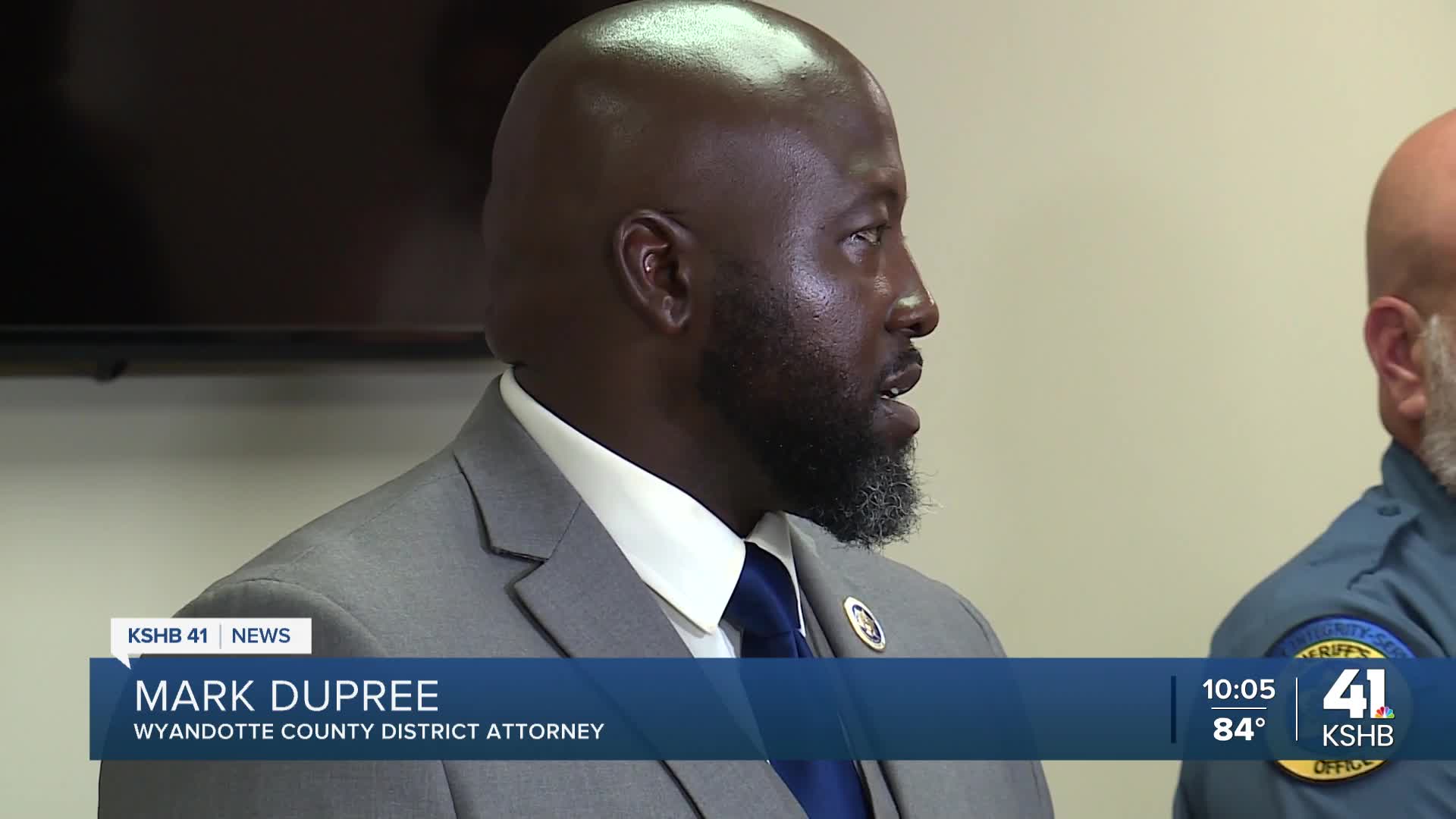KANSAS CITY, Mo. — A big decision is coming from the Wyandotte County District Attorney's office in the next several days.
District Attorney Mark Dupree will decide whether to seek the death penalty for Shawn Harris, the man accused of killing Wyandotte County Deputy Elijah Ming.

"This decision is not one that is made lightly," Dupree said in a news conference Tuesday. "We want to make sure that is a road we want to go back down to and that this community is ready and willing to go back down."
The case Dupree referenced in his statement involved Antoine Fielder.
Fielder was sentenced in March in a capital murder case for killing two Wyandotte County law enforcement officers.
The charges Shawn Harris faces in the Deputy Ming killing are capital murder and felon in possession of a firearm.

Defense Attorney Craig Divine told KSHB 41 In-Depth Reporter Alyssa Jackson that Dupree has many factors to consider in his decision-making process.
"You're gonna have a lot of wrangling and legal maneuvering done to try to get that taken off the table," Divine said. "It’s difficult to get this kind of a verdict."
Perception matters
Under Kansas law, when the killing of a law enforcement officer is intentional or premeditated, the case will always be tried as capital murder.
Divine is working on a capital murder case and has past experience with those cases.
However, he said that a capital murder charge doesn't always mean the death penalty.
There are nine people on death row in Kansas, but there haven't been any executions carried out in Kansas since 1965.
Death penalty cases are also highly scrutinized by the public and civil rights groups.
The ACLU recently challenged the death penalty in Kansas.
The organization was unavailable for an interview but sent a statement:
"We should continue to question whether this kind of state violence can ever disrupt the cycle of violence between community members — because essentially, we are killing people as punishment for killing people."
The Kansas Death Penalty Defense Unit will represent Harris.
"We have formally been appointed to represent Mr. Harris," said Mark Manna, Chief Capital Defender for the organization. "We represent all individuals whom are indigent and charged with capital murder in the State of Kansas. We will have no further comment at this time."
A death penalty case comes with hurdles
A challenge the defense and prosecution will face is finding an impartial jury.
"There are gonna be a certain number of people or certain segment of the population fundamentally opposed to the death penalty," Divine said. "There are a lot of people who think taking someone’s life because they took someone else’s life looks more like vengeance than justice."
Divine said if a guilty verdict is reached in a death penalty case, the defendant is entitled to a direct appeal to the Supreme Court.
He added that if the defendant asks for an appeal, the process could easily take a decade.
"We're talking about an irreversible consequence once this penalty is carried out, so if there's anything that justifies the court taking a look, they will because they want to make sure they are getting it right, and they should," Divine said. "That’s little comfort to the people who continually have to show up and sit in the gallery at the court of appeals and listen to oral argument, who have to meet attorneys from the state and constant picking at the scab."
From his experience with capital murder cases, the death penalty is expensive, and with such a high-profile case, there could be grounds for a change of venue.
When Divine worked on the David Jungerman case, where a man was convicted of killing a Kansas City attorney in front of his home, Divine said his law office sent hundreds of questionnaires out to pre-screen jurors.
He believes the Wyandotte County District Attorney's Office may need to implement the same strategy.
Divine said, "I don’t know anybody that doesn’t know what happened to this deputy."
What does it take to try a successful case?
A capital murder charge has the highest "mens rea," or threshold to hold someone legally responsible for a crime.
According to Divine, there also cannot be evidence of mental disease or drug impairment because those factors disable intent.
If prosecutors decide against capital murder, Divine believes the only fitting charge would be first-degree premeditated murder. That charge could come with a "hard 50" sentence, meaning the defendant must serve at least 50 years before being eligible for parole.
No early release for good behavior will be considered, and there's no guarantee the defendant will be released after serving 50 years.
"He [Dupree] is a fighter, a brave guy, and he is not afraid," Divine said. "If he thinks the right decision is to pursue the death penalty, he'll do it without hesitation. If he has to slug it out in court, that's what he'll do."
Dupree said Tuesday he will decide in 10 days on whether to seek the death penalty.
—
KSHB 41 reporter Alyssa Jackson covers portions of Johnson County, including Overland Park, Prairie Village and Leawood. Share your story idea with Alyssa.





